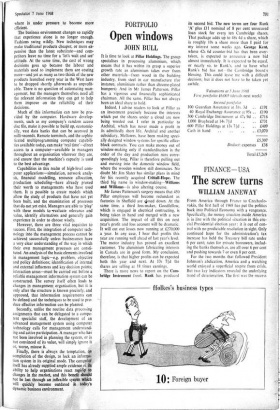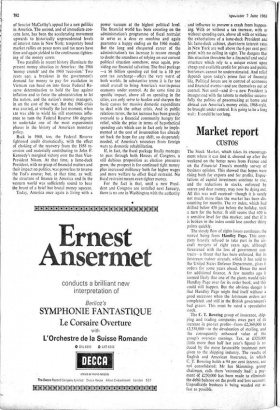The screw turns
FINANCE — USA WILLIAM JANEWAY
From America through France to Czechoslo- vakia, the first half of 1968 has put the politics back into Political Economy with a vengeance. Specifically, the money situation inside America is in line with the political situation in this cru- cial Presidential election year : it is out of con- trol with no predictable resolution in sight. Only continued hope for the administration's tax increase has held the Treasury bill rate under 6 per cent; rates for private borrowers, includ- ing the banks themsek ;2s, are all over 6 per cent and pushing towards 7 or even 8 per cent.
For the two months that followed President Johnson's abdication, America and a watching world enjoyed a superficial respite from crisis. But two key indicators revealed the underlying trend of deterioration. The first was the success of Senator McCarthy's appeal for a new politics in America. The second, and of immediate con- cern here, has been the accelerating movement upwards to historically unprecedented levels of interest rates in New York; temporary bond market rallies on peace news and tax news have time and again yielded to the continuous tighten- ing of the money screw.
Two parallels in recent history illuminate the present money situation in America: the 1966 `money crunch' and the 1960 'recession.' Two years ago, a breakout in the government's demand for money to pay for escalation in Vietnam ran head on into fierce Federal Re- serve determination to hold the line against inflation and to force the administration to let the nation, and the nation's money managers, in on the cost of the war. But the 1966 crisis was averted, at virtually the last moment, when LB) was able to wield his still enormous influ- ence to turn the Federal Reserve 180 degrees to undertake one of the most expansionist phases in the history of American monetary policy.
Back in 1960, too, the Federal Reserve tightened credit dramatically, with the effect of choking of the recovery from the 1958 re- cession and materially contributing to John F. Kennedy's marginal victory over the then Vice- President Nixon. At that time, a lame-duck President, with no grasp of financial matters and their impact on politics, was powerless to reverse the Fed's course; but, at that time, as well, the structure of finance in America and in the western world was sufficiently sound to bear the brunt of a brief but brutal money squeeze.
Today, America once again is living with a power vacuum at the highest political level. The financial world has been counting on the administration's programme of fiscal restraint to serve as a dens ex machina and again guarantee a happy ending on the 1966 model. But the long and chequered career of the administration's tax increase is reason enough to doubt the soundness of relying on our current political situation somehow, once again, pro- viding our financial salvation. The final package —a $6 billion spending cut tied to a 10 per cent tax surcharge—offers the very worst of both worlds. In substantive terms it is far too small overall to bring America's war-in-peace economy under control. At the same time its specific impact, above all on spending in the cities, can only serve to harden and sharpen the basic causes for massive domestic expenditure to deal with the urban crisis. And in public relations terms, the tax increase has been'grossly oversold to a financial community hungry for relief, while the price in terms of hypothetical spending cuts which can in fact only be imple- mented at the cost of insurrection has already set back the hope for any shift, so desperately needed, of America's resources from foreign wars to domestic rehabilitation.
If, in fact, the fiscal package finally manages to pass through both Houses of Congress, a still dubious proposition as _election pressures grow, the prospect is for continued tight money plus increased militancy both for higher wages and more welfare to offset fiscal restraint. No fiscal restraint means even tighter money.
For the fact is that, until a new Presi- dent and Congress are installed next January, there is no one in Washington with the authority
and influence to prevent a crash from happen- ing. With or without a tax increase, with or without spending cuts, above all with or without the exhortations of a lame-duck President and his lame-duck cabinet, short-term interest rates in New York are well above the 6 per cent peril point with no ceiling in sight. The dangers that this situation threatens for a financialland social structure which rely to a unique extent upon cheap and available credit for private and public borrowers cannot be underestimated. And relief depends upon today's prime fact of financial life. Political forces are in control of economic and financial events—and are themselves out of control. Not until—and if—a new President is inaugurated with the talents to mobilise success- fully the politics of peacemaking at home and abroad can America's money crisis, 1968-style, be brought under control. It is going to be a long wait : It could be too long.







































 Previous page
Previous page